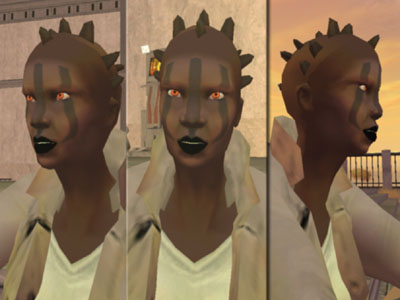Virtually a Racial Issue
OK, I feel for anyone who is abused by racism in any form. But I’m more than a little doubtful on the objectivity and accuracy of the account. I ran around in Star Wars Galaxies for a year as a black woman (with horns, even), and never had any problems.

We’re talking about racism in a game where you can look like a winged toaster, or a 500lb circus freak, or a roaming tentacle. What kind of virtual nazi magnet has people who care what anyone else looks like IN THE GAME? As for people wondering when she was going back to her “normal” appearance, I can kind of sympathize there. I get freaked out whenever someone changes their MSN Messanger display picture from a ladybug to a guy on a skateboard.
Seriously though, this article does bring up some good points, namely:
- Can a person knowingly taking on a certain appearance go into a virtual world without their own expectations about other people’s reactions, or are they prone to the same racial stereotypes? For example, if I go into the world looking like a cat, I might expect someone to call me “kitty”. Or, perhaps I can expect mysoginist comments if I go into the world looking like a blonde with a well-proportioned feminine figure (like the person in the article).
- What if no one could see their own avatar, and had no about their appearance. What would be the reactions of other people, and how could I then gauge their reactions?
- What if everyone in a virtual world looked the same? Now we’ve got to base reactions solely on our own actions.
- If we look for intolerance anywhere, we’re (unfortunately) liable to find it.
- Do some virtual worlds have different demographics than others? Are they more prone to racial issues than others?
- The Internet, like the real world, is a very intolerant place, but without most of the real world societal stop-gaps.
- Should the punishment fit the crime in the virtual world? i.e. force a racict into an appropriate skin for the duration of their play — make them walk a mile in someone else’s shoes?
We talk about these kinds of things in the real world, as if they’re something that we will never see in our lifetimes (i.e. an end to racism, sexism, ageism, etc.), but in the virtual world we have it, and we have it now. That’s why so many men become women in cyberspace. Let’s get out there with some objective studies and then talk about our conclusions.
![]()
New World Notes: THE SKIN YOU’RE IN
She spent three months in the skin of a black woman. Some of her friends shied away, she believes. Then there were the “guys that thought I was an easy lay, for lack of a better term. It scared me honestly, some of the assumptions made. Especially here where everything [in avatar appearance] is changeable with a click. I lost a couple of what I thought were good friends [who] stopped IMing and chatting. They were polite to a fault when I showed up, but [it] was weird. You know how you interact and something changes and no one tells you. Some were subtle, some weren’t.” She laughs without mirth, recalling how some friends would ask her questions such as, “‘[L]ike, when you going back to being you?'”

 Previous Post
Previous Post